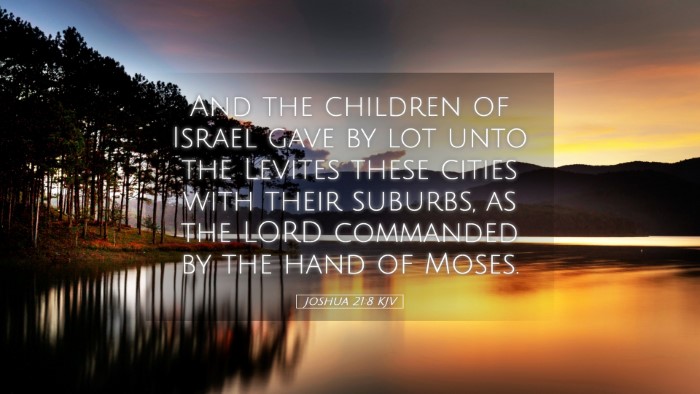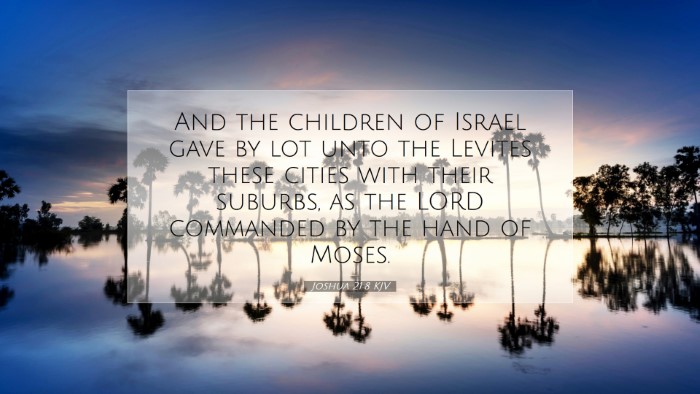Verse Overview: Joshua 21:8 states, "And the children of Israel gave by lot unto the Levites these cities and their suburbs, as the Lord commanded by the hand of Moses." This verse emphasizes the fulfillment of God's promise to the Levites, as designated through the distribution of cities and suburbs among them.
Contextual Significance
The allocation of cities to the Levites was not merely a practical matter but a theological one. It illustrates God's intention for the Levites to serve as mediators between Him and the people, focusing on their spiritual responsibilities rather than material wealth. This act of inheritance, which contrasts with other tribes, signifies their unique calling and role in preserving worship and law.
Commentary Insights
Matthew Henry's Commentary
Matthew Henry highlights that the Levites, who were set apart for the service of God, did not receive a territorial inheritance like the other tribes of Israel. Instead, their provision came from the cities allocated to them, which would allow them to sustain their priestly duties. Henry emphasizes the 'gracious provision' made for the Levites, signifying God's continual support for those dedicated to His service. He asserts that the division of cities manifested both God's authority and the Levites’ role in teaching, guiding, and serving the community and God.
Albert Barnes’ Commentary
Albert Barnes points out that the distribution of these cities by lot signifies divine guidance in the process. He argues that it reinforces the belief that the responsibilities and the opportunities for service are appointed by God, which reflects His sovereignty. Barnes also notes the importance of recognizing the significance of the Levites’ role in the nation, stating that they were not only caretakers of ritual purity but also educators of the law, spreading God’s word throughout Israel.
Adam Clarke's Commentary
Adam Clarke acknowledges the historical context of this distribution, noting the significance of the 'suburbs' mentioned in the verse. He explains that these suburbs were essential for the habitation of the Levites, giving them necessary provisions for their families and allowing them to live among the people they served. Clarke emphasizes that this community arrangement was vital for spiritual accountability and closeness between the Levites and the Israelites, cultivating a sense of unity and reliance on God’s covenant.
Conclusion
Joshua 21:8 not only recounts historical events but also serves as a profound reminder of God’s ongoing relationship with His people. Through the allocation of cities to the Levites, we see God’s providence, the necessary role of spiritual leaders, and the way He equips His people for worship and service. This passage calls us to reflect on our own spiritual inheritance and the vital place we hold in God’s divine plan.


